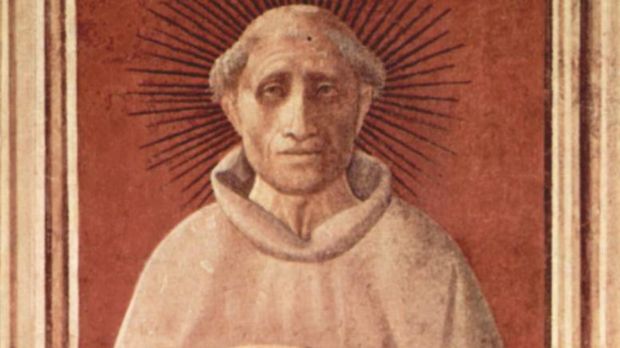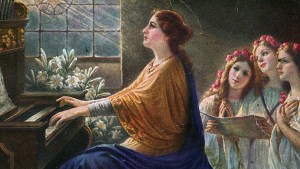It was a feast day on a spring day in 1268 in Todi, a prosperous town in Umbria (central Italy). What were they celebrating? A religious festival? The local chronicle doesn’t mention the nature of the event. However, it does record the tragedy that plunged the town into mourning and propelled one of its notable citizens onto a path of sanctity that ran counter to his previous life choices.
Jacopo dei Benedetti, a brilliant lawyer, and his wife, Vanna de Guidone, a member of the region’s finest nobility, took their seats on the grandstand. By marrying her, Jacopo — also a nobleman — had made a very fine marriage, but what counted in his eyes was the love he and Vanna had for each other for more than 10 years.
A tragic loss
Suddenly, the grandstand — poorly constructed, or shaken by the applause and stamping of the spectators — collapsed. It threw the high society of Todi into the void. Jacopo got up, stunned but unharmed, and had only one thought: to find his wife. Vanna was there, among the rubble and corpses, so badly injured that she died a moment later in her desperate husband’s arms.
For Jacopo, life without her had lost all interest. But in the despair that flooded him, Jacopo found a tiny glimmer of light. It was the last sign left for him by his dead wife, as if she wanted to show him the way from beyond. On his young wife’s corpse, he found a cilice — an instrument of penitence, usually a shirt or belt woven from rough fibers that irritate the skin and cause constant discomfort. The practice may sound odd today, but it was common at the time; the suffering was offered to God in reparation for sins and was a way to practice self-control and to overcome temptation.
How could Jacopo never have noticed Vanna’s spiritually motivated self-mortification? Of course, he knew she was pious, but now he discovered an unknown side of her. It was far removed from the superficial, worldly existence he had imagined fulfilled her.
Re-evaluating his life
In addition to his grief, he had to face up to his own personal issues: what had he done with his life, at nearly 40 years of age, and what kind of eternity was he preparing for himself if he went on like this? With his wife’s death, he was living only for his not-always-honest successes in the courtroom.
In this new light, he despised everything: his beautiful house, his money, his luxury, and his professional and social success. It had all been for Vanna; without her, he no longer wanted it.
From one day to the next, Jacopo became unrecognizable. From then on, he wandered the streets dressed in rags, looking lost, stopping passers-by to talk to them about God, the sufferings of Christ and his Mother, and to encourage them to repent.
Jacopo would later be said to have “disappointed” his former noble relations. For the time being, he didn’t disappoint them: he disgusted them. He was said to have gone mad with grief. He was shunned. The children threw stones at him and gave him a nickname, “Jacopone,” “Jacob the crazy, the clumsy,” which he adopted as a title of honor and which passed on to posterity.
Franciscan tertiary
Born probably the year Francis of Assisi died, in 1228, Jacopone discovered the saint’s way of life, and “Lady Poverty.” Following the Poverello’s example, he entered the Franciscan Third Order. He gave up everything and set out on the roads as an aimless pilgrim, a kind of “fool of God.” This life of wandering and virtual homelessness lasted 10 years.
In 1278, Jacopone asked to join the Minors, who refused to accept him except as a lay brother. The Order was then torn between the “Spirituals,” faithful to the rigor of Francis’ project and its absolute self-deprivation, and a current that wanted to soften these rules it judged unrealistic.
Jacopone joined the Spirituals, a choice that was to cause him a great deal of grief. This movement, recognized by Pope Celestine V (an authentic saint), was later condemned by Boniface VIII, an often unscrupulous, political pope whose legitimacy was disputed by some. (Dante famously placed Boniface in the eighth circle of hell in The Inferno!)
Among those who opposed him were the two Colonna cardinals, protectors of the Spirituals. They entered into open rebellion against the pontiff and shut themselves away in the fortress of Palestrina, besieged by Boniface. Jacopone’s aristocratic upbringing led him to join the Colonna family. When Palestrina surrendered in 1298, he was imprisoned with them and excommunicated, a sentence far more painful for him than the loss of his freedom.
Poet and gardener
Was it during this imprisonment that Jacopone revealed his talents as a poet, or was he already writing? We don’t know for sure. What is certain is that he bequeathed to posterity some 100 pieces, most of them written in Umbrian dialect and others in Latin. They include songs of praise and ballads.
His themes are essentially religious: divine praise of Christ and Our Lady, or of Francis and his ideal of poverty, but also laments on the lamentable state of the Church, and biting satires of Boniface VIII, who would never forgive him.
Indeed, Jacopone and the Colonna family were excluded from the general pardon granted for the Jubilee of 1300. It was not until the death of the pope and the election of Benedict XI that Jacopone was freed and reintegrated into the communion of the Church. He retired as a gardener to the convent of the Poor Clares at Collazone, near Perugia, where he died on December 25, 1306.
Regretting their harshness towards him, his brothers took his body back to Todi, where he is venerated as a saint. His cause for beatification, opened in the 19th century, never came to fruition. One possible reason is that Rome has a long memory and does not want to encourage criticism of pontifical power, even if it’s in such bad hands as those of Boniface VIII.
The author of Stabat Mater
This hasn’t prevented the Church from recognizing the piety and poetic talent of Jacopone de Todi. His most famous Latin piece is the Stabat Mater (“At the cross her station keeping…”), an admirable, typically Franciscan lament on the suffering of the weeping Virgin by the cross where the Son was crucified. It still nourishes Catholic meditation on the Way of the Cross during Lent and Good Friday.
Less well known is that he wrote an equivalent for Christmas, Stabat Virgo prætiosa, “The precious Virgin stood by the straw where her Child lay among the beasts…” Many of these texts, particularly those dedicated to the Passion, deserve to be rediscovered. On his tombstone, his epitaph sums up his life, shattered by tragedy and rebuilt by faith: “He went mad for love of Christ and conquered Heaven by force,” echoing the Gospel: “The Kingdom of Heaven suffers violence, and the violent seize it” (Mt 11:12).



